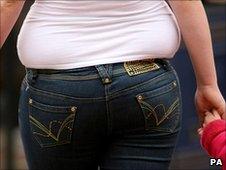Being overweight doubles IVF miscarriage risk
- Published

Women should have a weight appropriate to their height
Overweight women undergoing fertility treatment have double the risk of miscarriage of normal weight women, a UK study says.
More than a third of overweight and obese women had a miscarriage compared with one in five of normal weight women, a fertility conference heard.
Previous research has shown that women who conceive naturally are also at a higher risk if they are overweight.
Experts warned that obesity is putting women's fertility at risk.
The study in more than 300 women was carried out at the fertility clinic at Guy's and St Thomas' Hospital in London.
All the women had been implanted with a single five-day-old embryo that had been fertilised in the laboratory.
Half of them had a body mass index (BMI) of more than 25, which is classed as overweight. Fourteen per cent had a BMI of 30 or more, which is classed as clinically obese.
The researchers said there was no difference in egg or embryo quality at the start of the procedure, the European Society of Human Reproduction and Embryology conference heard.
Yet in women with a BMI of over 25 there was a 35% miscarriage rate.
This compared with 21% in women with a BMI less than 25.
After taking into account factors that may influence the risk of miscarriage, such as age, and smoking history, they found the risk of miscarriage was double in the overweight group.
Health problems
It is not known exactly why carrying extra weight increases the risk of miscarriage.
But one theory is that it may affect the lining of the womb and the success of implantation of the egg.
It is known that obesity is linked with increased health risks throughout pregnancy including pre-eclampsia and premature delivery.
Study leader Dr Tarek El-Toukhy said women undergoing IVF should be advised of the risks if they are overweight.
But he added: "The advice should be the same for any woman - that it is important to lose weight independent of how you conceive."
Professor Adam Balen, who works in Leeds and who wrote the British Fertility Society Guidelines on IVF in obese women, said 30 to 35% of women of reproductive age have a BMI over 30, putting their fertility in jeopardy.
He said that fertility clinics had to balance supporting women to lose weight with the knowledge that their age is often against them and fertility treatment should be started as soon as possible.
And he added: "There is an important health message here and new guidance has said that overweight women should take a higher dose of folic acid because of evidence their babies have a higher risk of congenital abnormalities."
Mr Tony Rutherford, chairman of the British Fertility Society, said all women should be advised to achieve a weight appropriate to their height before embarking on infertility treatment.
"We would like to see further resources put towards supporting women to lose weight to improve their chances of conceiving and maintaining a healthy pregnancy."